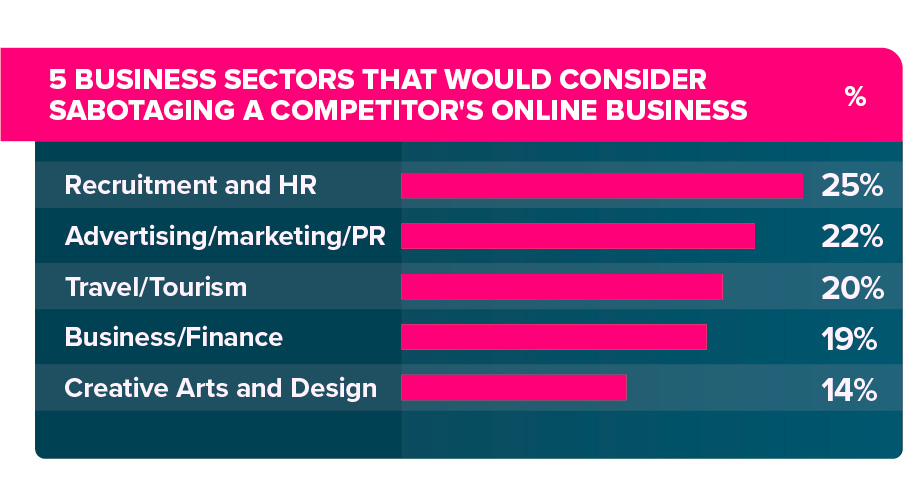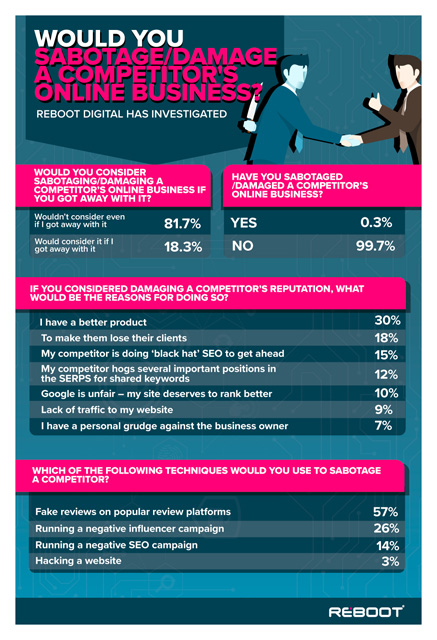Building a business is tough. But sometimes, the hardest challenge is competing with established businesses, especially if your business has a limited marketing budget. Consequently competition from other brands in your niche may cause some to act unethically and consider the use of sabotage toward a competitor (hindering/damaging the reputation of an online business).
Acts of online sabotage can involve discrediting a business’s products/service with negative (and often fake) reviews, as well as running a link spam campaign to bring on/cause a Google penalty, or even hacking a Web site.
In light of just how sinister the nature of sabotaging a competitor’s online business and reputation can be, Reboot Digital surveyed 1,672 business owners to expose just how many businesses would consider sabotaging a competitor if they THOUGHT THEY WOULD get away with. Reboot Digital also sought to uncover out of those who had sabotaged, which industries appeared to be more culpable.
Main Findings
Reboot’s survey can reveal that 18.3 percent WOULD consider sabotaging/damaging a competitor’s online business if they knew they would get away with it.
Encouragingly 81.7 percent WOULD NOT consider it at all, even if they knew they could get away with it.
Meanwhile 99.7 percent haven’t sabotaged a competitor, whilst a tiny 0.3 percent admitted that they have!
The Business Sectors That Would Sabotage a Competitor’s Online Business
Out of those who answered that they WOULD CONSIDER sabotaging an online competitor, Reboot Digital discovered the businesses liable. Recruitment and HR ranked first with 25 percent, whilst Advertising/Marketing/PR were second with 22 percent.
 Reasons for Businesses to Damage a Competitor’s Online Reputation
Reasons for Businesses to Damage a Competitor’s Online Reputation
The 18.3 percent of businesses that would consider online sabotage were then asked what the reasons would be (if they got away with it):
- I have a better product – 30 percent
- To make them lose their clients – 18 percent
- My competitor is doing “black hat” SEO to get ahead – 15 percent
Interestingly, just 9 percent of businesses cited “lack of traffic to your Web site” was enough of a reason to consider sabotaging a competitor for.
“I have a personal grudge against a business owner” warranted just 7 percent of business owners to consider unethical tactics.
Techniques Used by Businesses to Damage a Competitor’s Online Reputation
Fortunately there’s a big difference between saying you’ll damage a competitor’s online business and reputation and knowing how you’d do it.
Business owners cited these four techniques they’d use to sabotage a business:
- Fake reviews on popular review platforms – 57 percent
- Running a negative influencer campaign – 26 percent
- Running a negative SEO campaign – 14 percent
- Hacking a Web site – 3 percent
Reboot Digital were so intrigued by the results of the survey that they sent out a fake email to eighty-seven local businesses offering to sabotage their competitor’s online reputations and the results were interesting:
- Accepted the offer and wanted further details – 13 percent
- Declined the offer – 35 percent
- Didn’t reply – 52 percent
 What Can You Do?
What Can You Do?
Oliver Sissons, SEO manager of Reboot, has provided tips on how to spot if your Web site has been under attack from negative SEO:
Link Tracking Tools. Tools like Ahrefs, SEMrush, and Majestic SEO provide up-to-date reports on who is linking to your Web site and regularly auditing their reports will help you keep an eye on any potentially malicious activity. Google also provides an overview of who is linking to your Web site in Google Search Console.
If you do find someone pointing toxic or spam links to your Web site, you should put together a disavow file and submit it to Google. This should help nullify any negative effects the links might have on your Web site.
Tracking Brand Mentions. Not everyone trying to hurt your business will link to your Web site. It is possible that a competitor or disgruntled ex-employee is leaving fake, damaging reviews and mentions of your brand online to scare off potential new customers. Using tools like Google Alerts, BuzzSumo, and Hootsuite can help you find new mentions of your brand online and decide if they are legitimate or being created to hurt your marketing efforts.
Google Search Operators. By getting comfortable using Google search operators, you can search Google’s database of billions of Web sites to find those specifically talking about your business. Start playing around with them by switching the example text out with your businesses or Web site name and details. You might be surprised by what shows up.
Review Advertising Data. If you are running any paid ads online, you need to know how to review the campaigns’ performances and dive into the huge amount of data made available to you. Look out for any sudden spikes in the amount of impressions or clicks from a single area (especially if you are targeting a broader location) and start analyzing where the money you are spending is going.
Keep an Eye on Your Review Profiles. You should already be responding to new positive and negative reviews on your Web site or business. You should know about and have access to all review profiles about your business so you can dispute any fake ones that might be sent your way.
Keep Your Logins Safe. The best way to prevent a hack or recover quickly from one is to keep any login or access details secure and safe. Also, familiarize yourself with who to contact if your Web site is ever hacked.
Check for Duplicate Content. Sometimes spammers will take your content and publish it on countless other Web sites to lower the value of your Web site. Check by taking random strings and sentences from your key pages and search them in Google surrounded by quotation marks. If any of these spammy Web sites are outranking your own content, you need to find out why. You could look at having the duplicated Web sites taken down for copyright reasons or might even have to update and improve your own content.
To learn more, click here.










